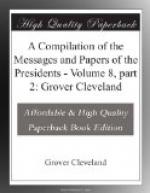of their country. In the name of democracy they
speak, warning the people against the influence of
wealth and the danger of aristocracy. History,
ancient and modern, is full of such examples.
Caesar became the master of the Roman people and the
senate under the pretense of supporting the democratic
claims of the former against the aristocracy of the
latter; Cromwell, in the character of protector of
the liberties of the people, became the dictator of
England, and Bolivar possessed himself of unlimited
power with the title of his country’s liberator.
There is, on the contrary, no instance on record of
an extensive and well-established republic being changed
into an aristocracy. The tendencies of all such
governments in their decline is to monarchy, and the
antagonist principle to liberty there is the spirit
of faction—a spirit which assumes the character
and in times of great excitement imposes itself upon
the people as the genuine spirit of freedom, and, like
the false Christs whose coming was foretold by the
Savior, seeks to, and were it possible would, impose
upon the true and most faithful disciples of liberty.
It is in periods like this that it behooves the people
to be most watchful of those to whom they have intrusted
power. And although there is at times much difficulty
in distinguishing the false from the true spirit,
a calm and dispassionate investigation will detect
the counterfeit, as well by the character of its operations
as the results that are produced. The true spirit
of liberty, although devoted, persevering, bold, and
uncompromising in principle, that secured is mild
and tolerant and scrupulous as to the means it employs,
whilst the spirit of party, assuming to be that of
liberty, is harsh, vindictive, and intolerant, and
totally reckless as to the character of the allies
which it brings to the aid of its cause. When
the genuine spirit of liberty animates the body of
a people to a thorough examination of their affairs,
it leads to the excision of every excrescence which
may have fastened itself upon any of the departments
of the government, and restores the system to its
pristine health and beauty. But the reign of
an intolerant spirit of party amongst a free people
seldom fails to result in a dangerous accession to
the executive power introduced and established amidst
unusual professions of devotion to democracy.
The foregoing remarks relate almost exclusively to matters connected with our domestic concerns. It may be proper, however, that I should give some indications to my fellow-citizens of my proposed course of conduct in the management of our foreign relations. I assure them, therefore, that it is my intention to use every means in my power to preserve the friendly intercourse which now so happily subsists with every foreign nation, and that although, of course, not well informed as to the state of pending negotiations with any of them, I see in the personal characters of the sovereigns, as well as in the mutual interests of




